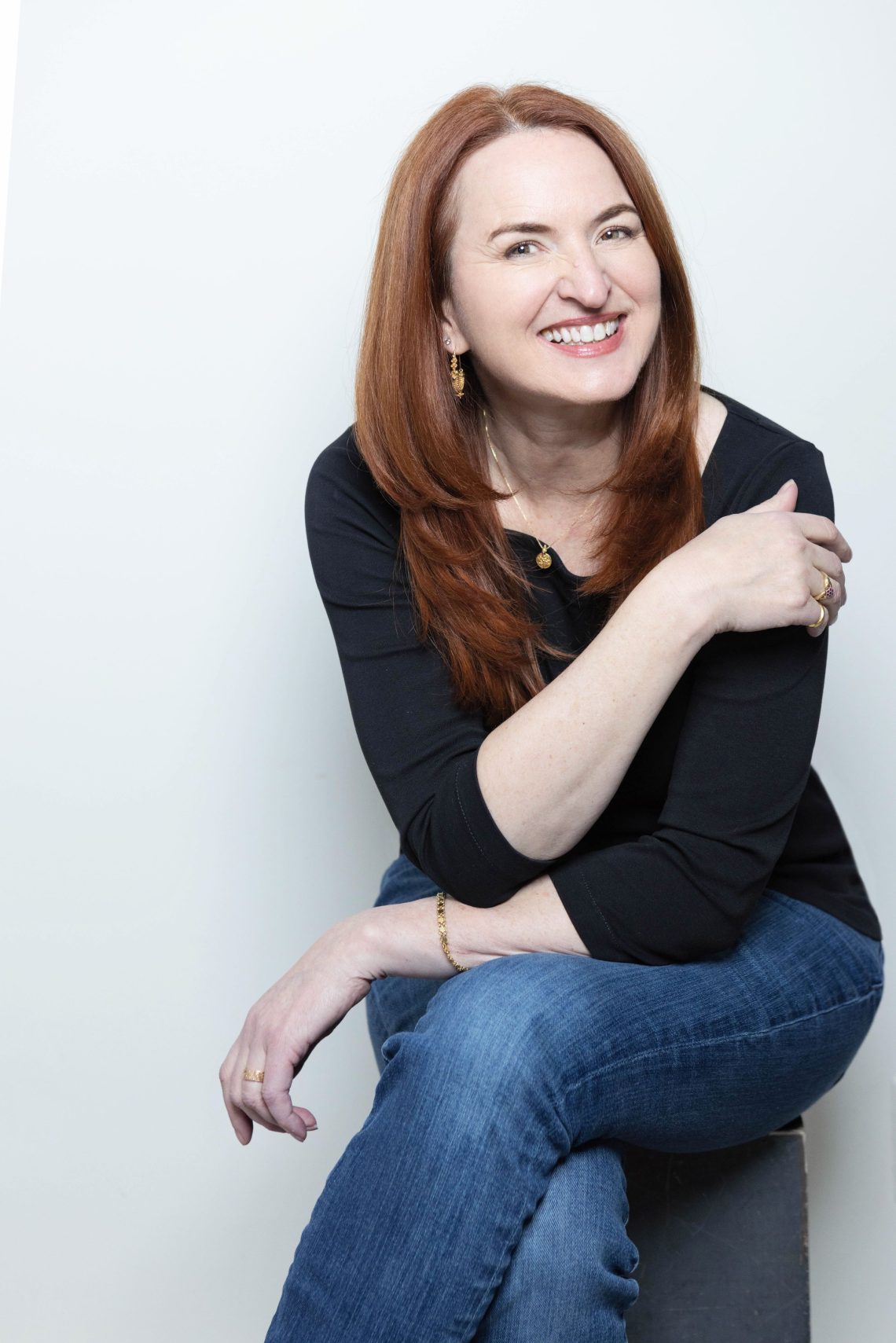When you teach a child to read, you open up new galaxies for them. But if you want them to truly reach for the stars, you have to help them build the rocket ship first. No one knows this better than Bonnie Wallace, whose new book series, We Can Books, teaches children to read with the power of phonetics. “Speech is a pretty hardwired thing,” she explains. “If we’re not vision impaired, that’s a primary way that we all learn. We can learn things just by being exposed to them visually and auditorily. But reading is not something that is natural to humans. Reading actually has to be taught and learned. And that’s where the phonics thing is so effective because it’s literally tools. Once you understand that this letter makes this sound, or maybe also that sound, because we know what the vowels and some of the letters are, you’ve got the building blocks to then put it together when you encounter a word you’ve never seen before. Interestingly the way those two things work together turns out to be very important. Part of what makes somebody a good reader is if they have a good vocabulary. So if you’re a child and you’re looking at a page with a word on it that you’ve never seen before, if you learned how to read phonetically, you can probably break it down and figure it out. But it’ll be easier for you to figure it out if you’re actually familiar with the word. Then you can go, ‘Oh, it’s this word. I know this word. That’s what this is.’ But if they’ve never heard the word before because their vocabulary is not rich because they’re not exposed to a lot of good words, that’s more challenging.”
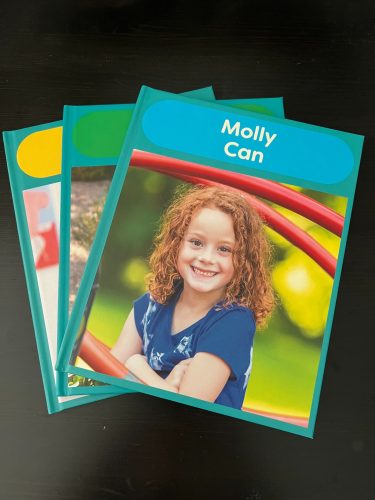 Bonnie’s father, Bob, laid the foundation for her love of reading as well as that of her two daughters by dreaming up the very first We Can book three decades ago. “When I was young, I was very fortunate. My parents read to me every night before I went to bed. Being exposed to books and being exposed to reading is so important for a child, and I had that. When it was time for me to learn how to read, my dad taught me how to read the phonics – just the words and I still loved it. It made sense to me and it was exciting. And so I was lucky. I got to learn how to read early and well. Fast forward to when my kids were in that age group and my dad’s like, ‘Okay, I want to do something special for them.’ He quickly discovered how to provide his granddaughters, Claire and Chloe, with the tools to tackle any word. “His innovation was realizing that you could create an association between a familiar image, something from the child’s world, with a keyword, a phonics keyword. Those two things together unlock everything. For example, on a page with ‘cat, fat, rat, hat,’ if there’s a picture of the child holding their cat, or with a hat on or something else that makes sense with one of those words, it’s like, ‘oh okay.’ Once you’ve got that, all the other words on the page that are phonetically related fall into place intuitively. It makes it an intuitive process and it’s so effective. My kids both learned how to read from a very basic cut and paste three ring binder version of what we have now. Now with app technology and print on demand, we can have beautiful hardback books, which is pretty cool.” Association becomes a riveting avenue to literacy for little minds. “The whole key to the system is the magic of association. They get so excited when they see photos of themselves and their world, their dad, their dog, their mom, their bedroom, their porch, whatever, their world in a book. The beta testers we’ve had so far have reported back to me just how incredibly excited the kids are, saying, ‘That’s me in a book!’ It’s not like a little cut out of their face pasted onto a cartoon character or something really cheesy. It’s actually them. My kids are in their twenties and thirties now, but I remember it vividly at that age. They just get so excited. They like to see themselves as babies. They just like to see themselves reflected back. And it’s part of what keeps them engaged as they’re doing, let’s be honest, the challenging intellectual work of figuring out, at the age of four or five or six, that those letters together make a sound and that the sound is associated with meaning. That’s a big leap for a little human to make. But again, the excitement of seeing those familiar images helps keep them engaged, which is half the battle.”
Bonnie’s father, Bob, laid the foundation for her love of reading as well as that of her two daughters by dreaming up the very first We Can book three decades ago. “When I was young, I was very fortunate. My parents read to me every night before I went to bed. Being exposed to books and being exposed to reading is so important for a child, and I had that. When it was time for me to learn how to read, my dad taught me how to read the phonics – just the words and I still loved it. It made sense to me and it was exciting. And so I was lucky. I got to learn how to read early and well. Fast forward to when my kids were in that age group and my dad’s like, ‘Okay, I want to do something special for them.’ He quickly discovered how to provide his granddaughters, Claire and Chloe, with the tools to tackle any word. “His innovation was realizing that you could create an association between a familiar image, something from the child’s world, with a keyword, a phonics keyword. Those two things together unlock everything. For example, on a page with ‘cat, fat, rat, hat,’ if there’s a picture of the child holding their cat, or with a hat on or something else that makes sense with one of those words, it’s like, ‘oh okay.’ Once you’ve got that, all the other words on the page that are phonetically related fall into place intuitively. It makes it an intuitive process and it’s so effective. My kids both learned how to read from a very basic cut and paste three ring binder version of what we have now. Now with app technology and print on demand, we can have beautiful hardback books, which is pretty cool.” Association becomes a riveting avenue to literacy for little minds. “The whole key to the system is the magic of association. They get so excited when they see photos of themselves and their world, their dad, their dog, their mom, their bedroom, their porch, whatever, their world in a book. The beta testers we’ve had so far have reported back to me just how incredibly excited the kids are, saying, ‘That’s me in a book!’ It’s not like a little cut out of their face pasted onto a cartoon character or something really cheesy. It’s actually them. My kids are in their twenties and thirties now, but I remember it vividly at that age. They just get so excited. They like to see themselves as babies. They just like to see themselves reflected back. And it’s part of what keeps them engaged as they’re doing, let’s be honest, the challenging intellectual work of figuring out, at the age of four or five or six, that those letters together make a sound and that the sound is associated with meaning. That’s a big leap for a little human to make. But again, the excitement of seeing those familiar images helps keep them engaged, which is half the battle.”
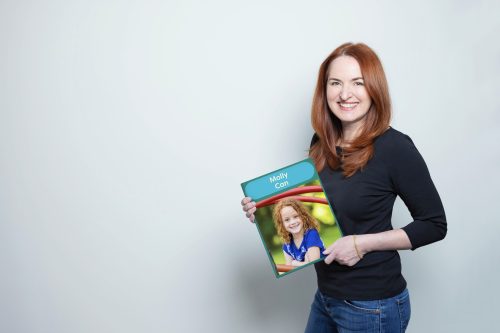 Given that her own cherished father-daughter nostalgia forms the nucleus of the We Can Books lore, Bonnie realized that transforming Bob’s devotion to his granddaughters into a catalyst for family bonding across communities would be the ideal way to honor a larger-than-life man. “My dad is a very special guy. He’s been retired for about 30 years now. He’s in his mid eighties at this point. One of the many wonderful things he’s done in his life was to create the original We Can books. But in addition to that, he’s bicycled across the entire US, completely on his own, before cell phones. He lived on an old wooden boat for many years. He runs the food bank in his local community. He built his own house with his own hands. He’s just an extraordinary guy.” Her husband pitched the idea of infusing Bob’s original philosophy into the business. ”When I was sharing the story of We Can Books with my husband Simon and showing him the old originals, (which I still have of course because they’re treasures), I said, ‘What could we do with this? Could we create little cartoon books with them so there’d be animals? I could just print them up and then sell them on Amazon and people could maybe just do it that way.’ It wasn’t personalized, but the technology would be out there. Simon said, ‘No, no, let’s go big here. Let’s do what your dad did for your girls, but let’s do it so that everybody can do it.’ When I shared the idea with my dad that we might be able to take his beautiful little inspiration and make it available for literally countless families…you should have seen his face, he was so happy. He’s so excited. It’s a legacy project really to honor my dad at the end of the day. It’s a big labor of love. We’ve been working on it for two years and it just pleases me so much to see how joyful he feels about it.”
Given that her own cherished father-daughter nostalgia forms the nucleus of the We Can Books lore, Bonnie realized that transforming Bob’s devotion to his granddaughters into a catalyst for family bonding across communities would be the ideal way to honor a larger-than-life man. “My dad is a very special guy. He’s been retired for about 30 years now. He’s in his mid eighties at this point. One of the many wonderful things he’s done in his life was to create the original We Can books. But in addition to that, he’s bicycled across the entire US, completely on his own, before cell phones. He lived on an old wooden boat for many years. He runs the food bank in his local community. He built his own house with his own hands. He’s just an extraordinary guy.” Her husband pitched the idea of infusing Bob’s original philosophy into the business. ”When I was sharing the story of We Can Books with my husband Simon and showing him the old originals, (which I still have of course because they’re treasures), I said, ‘What could we do with this? Could we create little cartoon books with them so there’d be animals? I could just print them up and then sell them on Amazon and people could maybe just do it that way.’ It wasn’t personalized, but the technology would be out there. Simon said, ‘No, no, let’s go big here. Let’s do what your dad did for your girls, but let’s do it so that everybody can do it.’ When I shared the idea with my dad that we might be able to take his beautiful little inspiration and make it available for literally countless families…you should have seen his face, he was so happy. He’s so excited. It’s a legacy project really to honor my dad at the end of the day. It’s a big labor of love. We’ve been working on it for two years and it just pleases me so much to see how joyful he feels about it.”
Literacy is an often overlooked building block in a child’s self-confidence, as Bonnie points out. “If you can give kids that foundation, that grounding with clarity about integrity, what’s right and wrong, really what matters, what doesn’t matter. People get very confused about that stuff. And then the basic tools for a good life, which to me honestly one of the big ones is literacy. Again, part of what gave me the life that I’ve had is the fact that I could learn. I learned how to read early and well. That meant school was fun and school was easy. I thought, ‘Oh, I can do this.’ It was that stuff, it loops back into your self-esteem. And so when you go to school and you’re not resisting it because it’s hard and you feel dumb, instead you’re thinking, ‘This is fun, this is easy.’ Those are two very different paths that diverge in a wider and wider gap as time goes on. And because school was fun and easy for me, I did well with all subjects, not just reading. That is the case for all children. If they can crack that code in a timely fashion so that they’re not struggling and trying to catch up, then the doors are open and they can go almost anywhere. Those are two of the big things.” As parents lean more into technology, we stray further from potentially more effective modes of learning. “Look, I’m on my screen all day. I’m not different from anybody. My laptop and my phone and I are besties,” she admits with a laugh. “But I really do worry about young children growing up with too much screen time. There’s all kinds of studies that show that they don’t do as well on exams with reading and certain executive functions if they’re on screens too many hours a day. Other studies have come out that show that all of us, not just children, at any age learn better and retain what we learn more effectively if we’re reading it off of paper and not screens. It’s not really understood why that’s the case. The speculation is maybe it’s the subtle flickering of the screen that makes extra work for our brains, so we’re splitting our functions when we’re looking at things on screens. I don’t know. If you can get kids to spend more time looking at paper books and not at screens it’s going to be better for them in the long run. That’s another thing that We Can Books is working on. It would be easy to create digital versions of the We Can books that you could learn with on your iPad. It would be super easy to do that. We have made an executive decision not to do that because part of our ethos is the value of physical print books. So that’s what we’re delivering, and I feel good about that.”
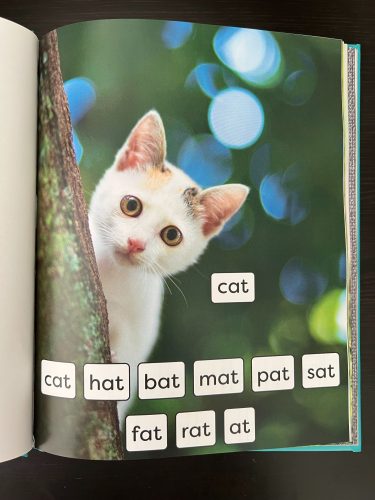
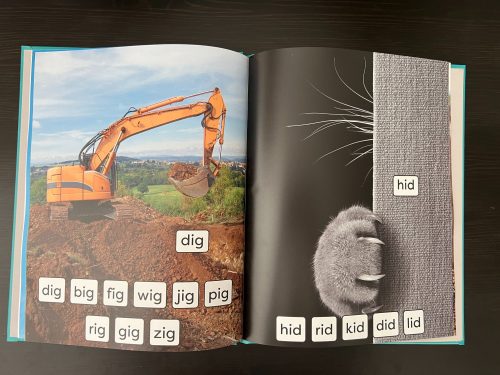 Physical, tactile books are also a gateway to an irreplaceable bonding ritual between adults and children. “Another important piece of what’s baked into the We Can model is that there’s something very special, and I’m going to go as far as to say sacred, about having a parent and a child or a grandparent and a child or some loved trusted adult and a child sitting down together and looking at a book together. It’s intimate. It’s special. The child feels that love and that they know that they’re being given all of the energy and attention of that adult. That adult isn’t staring at their own screen while the kid is staring at their own screen. It’s important and I hope that among other things, that we can be part of that for a lot of families.” The euphoria of helping a child learn cannot be understated. “Their world explodes and it’s the most joyful, exciting thing to watch their little faces as they figure it out. And then once they have the basic idea, they just run with it. There’s a progression while you figure out what works and they’re off to the races once they get the basic idea. It’s so fun!” We Can Books is gamely approaching our increasingly technological landscape with self-aware realism. “There’s an irony to using an app to create a physical book to help children learn how to read, but the flip side of that is, in a weird way, it is more important than it ever has been for children to learn how to read well because we are living our lives online and that’s probably not going to change. It’s probably only going to be more like that. If you are a solid competent reader, the world is open to you, especially these days. In the palm of your hand, you can learn about anything, you can read about anything, you can search for anything. It’s extraordinary. But if that’s difficult for you, it’s closed and it’s scary and heartbreaking. The lives of the kids who struggle are much more difficult than they need to be.” We additionally must focus on kids with dyslexia and special needs, who are at a higher risk of falling behind in the wake of the pandemic. “The pandemic really knocked everybody sideways in terms of everything, including learning these basic skills. And so I know that a lot of parents are really concerned about where their children are in their learning journeys. I think all we can ever do is start where we are. There’s a lot of children who aren’t where they’re supposed to be at a certain age now because of the pandemic and how difficult schooling was for the last few years. But if we can just meet them where they are and work hard on grounding the basic skills, the basic reading and of course math and the other things, they will catch up because kids are resilient. I am not an expert in dyslexia, but I do understand that phonics seems to be the best approach for kids who are dyslexic because it can help them figure out the word if they just are able to piece it together phonetically.”
Physical, tactile books are also a gateway to an irreplaceable bonding ritual between adults and children. “Another important piece of what’s baked into the We Can model is that there’s something very special, and I’m going to go as far as to say sacred, about having a parent and a child or a grandparent and a child or some loved trusted adult and a child sitting down together and looking at a book together. It’s intimate. It’s special. The child feels that love and that they know that they’re being given all of the energy and attention of that adult. That adult isn’t staring at their own screen while the kid is staring at their own screen. It’s important and I hope that among other things, that we can be part of that for a lot of families.” The euphoria of helping a child learn cannot be understated. “Their world explodes and it’s the most joyful, exciting thing to watch their little faces as they figure it out. And then once they have the basic idea, they just run with it. There’s a progression while you figure out what works and they’re off to the races once they get the basic idea. It’s so fun!” We Can Books is gamely approaching our increasingly technological landscape with self-aware realism. “There’s an irony to using an app to create a physical book to help children learn how to read, but the flip side of that is, in a weird way, it is more important than it ever has been for children to learn how to read well because we are living our lives online and that’s probably not going to change. It’s probably only going to be more like that. If you are a solid competent reader, the world is open to you, especially these days. In the palm of your hand, you can learn about anything, you can read about anything, you can search for anything. It’s extraordinary. But if that’s difficult for you, it’s closed and it’s scary and heartbreaking. The lives of the kids who struggle are much more difficult than they need to be.” We additionally must focus on kids with dyslexia and special needs, who are at a higher risk of falling behind in the wake of the pandemic. “The pandemic really knocked everybody sideways in terms of everything, including learning these basic skills. And so I know that a lot of parents are really concerned about where their children are in their learning journeys. I think all we can ever do is start where we are. There’s a lot of children who aren’t where they’re supposed to be at a certain age now because of the pandemic and how difficult schooling was for the last few years. But if we can just meet them where they are and work hard on grounding the basic skills, the basic reading and of course math and the other things, they will catch up because kids are resilient. I am not an expert in dyslexia, but I do understand that phonics seems to be the best approach for kids who are dyslexic because it can help them figure out the word if they just are able to piece it together phonetically.”
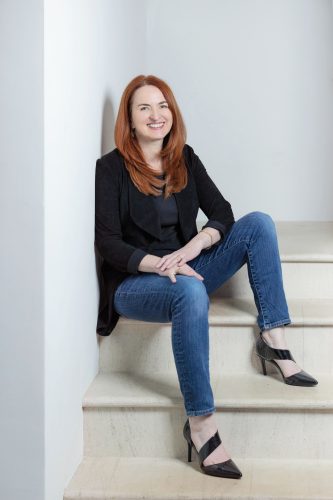 Bonnie recognizes the difficulties of juggling life and parenthood, but also urges adults to not pass off the responsibility of literacy onto their child’s teachers. “Parents are busy. We’re busy. Life has got a lot of moving parts to it and it’s easy to just think, ‘My kid is going to learn how to read in school. That’s what schools are for.’ The thing is, it’s such a critical learning skill for all of life to be able to read well. Either the doors are open if you can or the doors are closed if you can’t. It behooves the special adults in a child’s life to take the time to sit down with them and make it something that they look forward to. Again, children love to have special time with the people they love. Sit down together and help them decode words, help them learn how to read. This is not something we really should be pawning off on the schools. A teacher with 30 kids in a classroom is not going to have the chance to give the one on one that makes all the difference for all those kids.” We Can Books is designed with efficiency – and playfulness! – in mind. “If you only use the photos that are preloaded as backup photos, you could make the whole book in about five minutes,” she chuckles. “Now, I hope that people use their own photos because that’s when the children get excited and that’s when the magic really happens and they say, “That’s my cat, that’s my hat, that’s my world. That’s super engaging for them. My very first beta tester is a grandmother and a friend of mine and she did exactly that. She had a fun weekend afternoon with her granddaughter making the book together and you can see how much fun they had because you can see it in the photos. When they got the book two weeks later, it was not only this fabulous, one of a kind special phonics book for her granddaughter to start to learn how to read with, but it was also this record of this magical day they spent together.”
Bonnie recognizes the difficulties of juggling life and parenthood, but also urges adults to not pass off the responsibility of literacy onto their child’s teachers. “Parents are busy. We’re busy. Life has got a lot of moving parts to it and it’s easy to just think, ‘My kid is going to learn how to read in school. That’s what schools are for.’ The thing is, it’s such a critical learning skill for all of life to be able to read well. Either the doors are open if you can or the doors are closed if you can’t. It behooves the special adults in a child’s life to take the time to sit down with them and make it something that they look forward to. Again, children love to have special time with the people they love. Sit down together and help them decode words, help them learn how to read. This is not something we really should be pawning off on the schools. A teacher with 30 kids in a classroom is not going to have the chance to give the one on one that makes all the difference for all those kids.” We Can Books is designed with efficiency – and playfulness! – in mind. “If you only use the photos that are preloaded as backup photos, you could make the whole book in about five minutes,” she chuckles. “Now, I hope that people use their own photos because that’s when the children get excited and that’s when the magic really happens and they say, “That’s my cat, that’s my hat, that’s my world. That’s super engaging for them. My very first beta tester is a grandmother and a friend of mine and she did exactly that. She had a fun weekend afternoon with her granddaughter making the book together and you can see how much fun they had because you can see it in the photos. When they got the book two weeks later, it was not only this fabulous, one of a kind special phonics book for her granddaughter to start to learn how to read with, but it was also this record of this magical day they spent together.”
She knows a thing or two about raising extraordinary kids herself. Claire grew up to be renowned vocal coach Claire Hosterman, while Chloe became pop megastar Dove Cameron. “I do feel strongly that part of why my daughters have been so successful and really are such big forces in the world is because I infuse them with my belief in them. I believe in them with all of my heart and I know they can do anything. I see that for them. If you take a stand like that for your child to say they can do this, then the child tends to believe it and run with it.” Their mother’s reverence is evident in her beaming smile. “Claire literally helps people find their voice, which is such a great metaphor. Literally she does, but also metaphorically she does. Because I think honestly at the end of the day, Claire is a healer. That’s really who she is. She does it through teaching voice very effectively. But she’s a healer, which is part of why she’s so incredibly powerful and effective. And Chloe has a really special gift for speaking the truth so that other people can speak their truth. I am incredibly proud. They are my greatest inspirations, which is a beautiful little circle, isn’t it? Now they inspire me and it’s very sweet.”
Bonnie is eagerly embarking on a bright, invigorating new chapter where she can redefine what it means to be a helper in a broader context. “I am at such a cool time in my life in my late fifties, and people can get really weird about aging, but I’ve never been happier. I feel like I have a mission. My kids are on their feet and I’m always always there for them, but they’re good. I can turn my energy and attention now to a new thing. We Can Books is so in alignment with all of my values. It gets me out of bed in the morning. It’s like, okay, what are we going to do to push this baby forward and get it out there for people? It’s really joyful and satisfying.” Though the company is only in its infancy, true to its spirit, We Can Books is already extending a hand outward into the community. “In addition to our mission to help children learn how to read in a very intuitive, intimate, fun way with these books, we also plan on giving 10% of our annual profits to literacy groups. Not everybody can afford these books but we want to help all kinds of kids, including underserved kids. So we will be giving 10% of our profits every year to groups that support literacy for underserved children.” Her ambitions will doubtless empower kids everywhere to blast off to the moon.
Read more Celebrity Interviews on ClicheMag.com
Bonnie Wallace Can: We Can Books, Raising Extraordinary Daughters, and Embracing a New Season of Life. Photo Credit: Dawn Bowery and courtesy of We Can Books.

